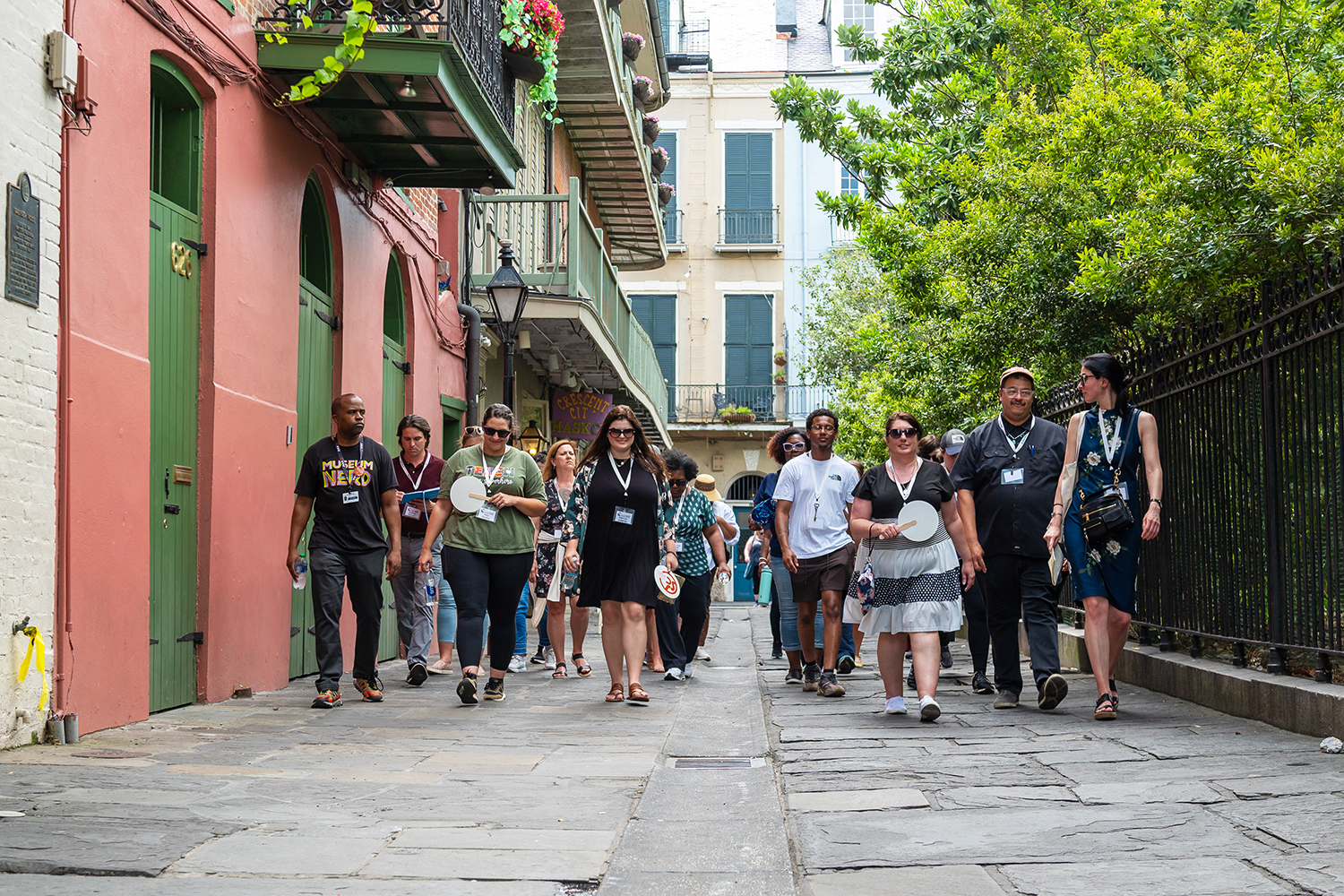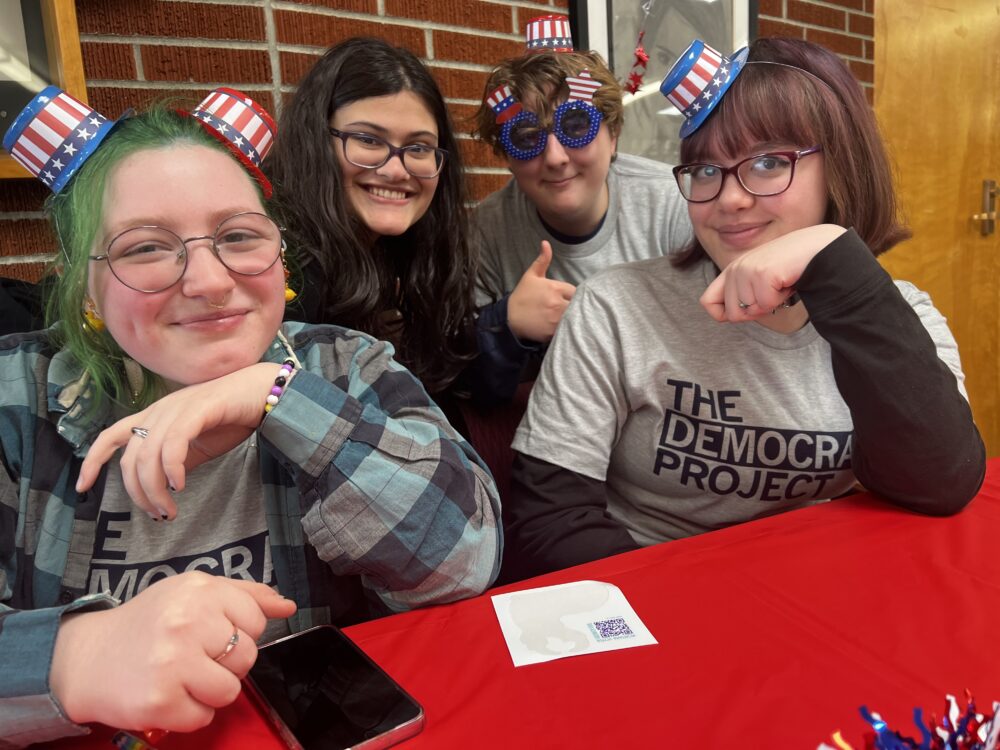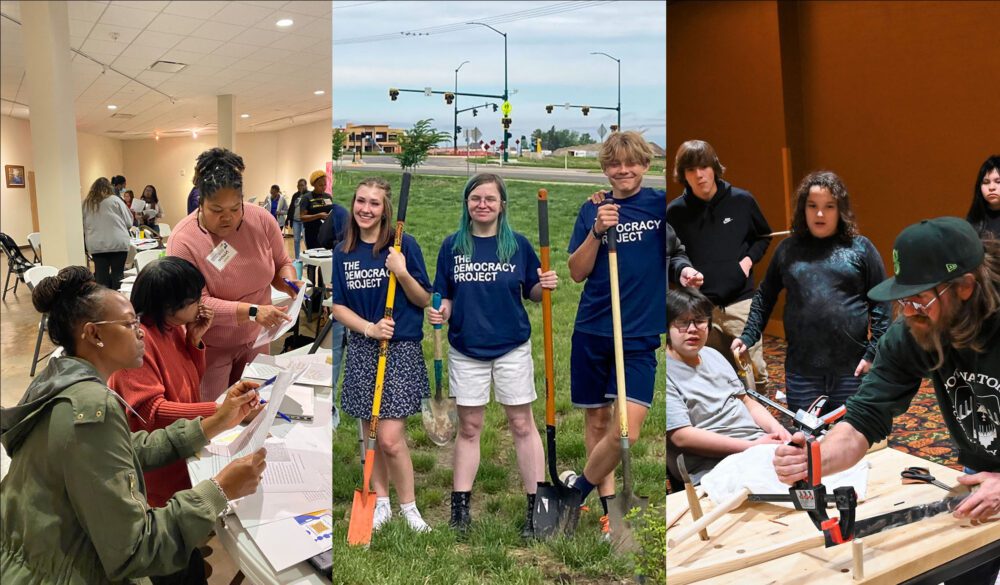Since 1982, the Federation has awarded the Schwartz Prize to up to three humanities councils for outstanding work in the public humanities each year. In this series, we are profiling the winners of the 2024 Schwartz Prize: the Louisiana Endowment for the Humanities, Humanities Montana, and Wisconsin Humanities.
For 20 years, Louisiana’s social study standards had seen very little change. Then, in 2022, the Louisiana Department of Education (LDOE) announced a completely new set of standards. Rather than zigzagging back and forth in time (ancient history one year, Louisiana history another, then world history, for example), students in 4th-8th grades will now learn social studies subjects chronologically, from pre-history through the 21st century.
For teachers, this was a much larger change than simply rearranging the order of their lessons. Previously, Louisiana state history, geography, and civics were taught exclusively in the 3rd and 8th grades; the new standards integrate Louisiana history into each grade from 4th-8th, requiring teachers to place regional subjects into a wider world history timeline. Many educators now face the challenge of learning new content and developing grade-appropriate lesson plans from scratch. For example, a 6th-grade history teacher with twenty years in the classroom might have never taught a lesson on Louisiana history; now, without the help of any new textbooks, they’d need to be an enough of an expert on French Colonial Louisiana to develop curriculum and grade-levelled lesson materials.
The Louisiana Endowment for the Humanities (LEH) saw the challenges educators were facing and partnered with the Louisiana Department of Education to support teachers, beginning with a survey in 2022 to determine what teachers most needed and wanted during this transition. Based on this feedback and ongoing conversations, LEH created the Institute for Louisiana Culture and History (ILCH) that same year to “ensure that every Louisiana student has access to free digital social studies content and that every Louisiana educator receives the pedagogical support necessary to bring this content to life in the classroom.”
“Educators…are the folks on the ground doing this work. Ask them what they need, listen to them.”
-Clare Shelburne, Program Manager, Louisiana Endowment for the Humanities
Federation of State Humanities Councils interview with LEH’s Clare Shelburne at the 2024 National Humanities Conference.
The Institute for Louisiana Culture and History supports teachers in two key ways: first, through free online resources, and second, through free in-person workshops. For both prongs of the program, LEH leveraged an existing flagship resource, 64 Parishes Encyclopedia, their digital encyclopedia of Louisiana history and culture. 64 Parishes contains over 1,300 expert-vetted written entries on archeology, politics, food, architecture, sports, music, business, and more alongside images and audio. With more than 600,000 unique annual users, it was already a trusted source for K-12 students and teachers. In fact, 8th-grade teachers were using it for their Louisiana History course, and when schools in Louisiana went virtual during the COVID-19 pandemic, the site saw an uptick in page views as the demand for high-quality digital resources increased.
The Louisiana Department of Education mapped the new curriculum standards, and LEH got to work identifying corresponding 64 Parishes entries and adapting them to grade-specific reading levels through a rigorous peer-reviewed process. For example, two adult-reading-level entries on Poverty Point were adapted into this 4th-grade-level entry. Visiting one of the original entries, you’ll see large text and a link on the right of the page pointing to the 4th-grade alternative. All entries include high-resolution images teachers can use to bring their lessons to life. Educators looking for grade-specific resources can find them in neat categories on a new page of 64parishes.org alongside a detailed resource map connecting specific entries to each new standard.
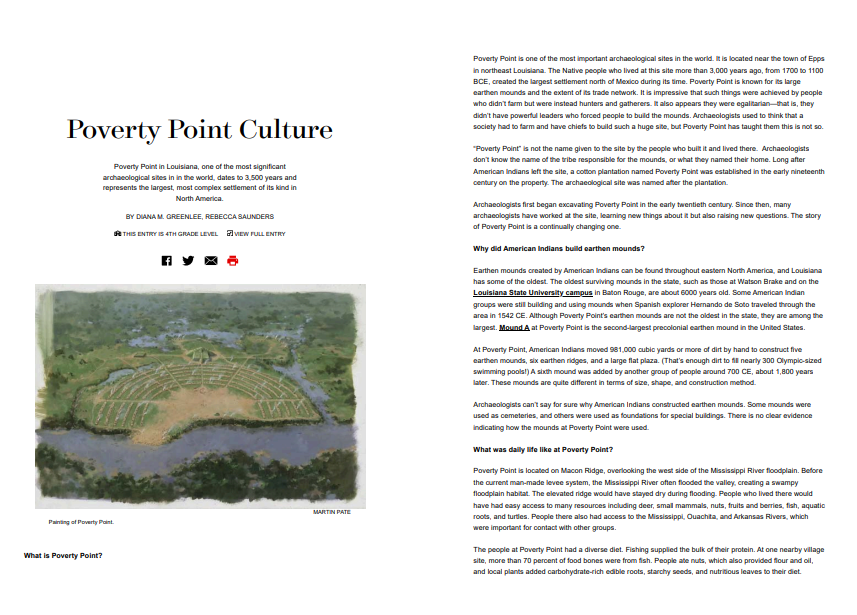
The Louisiana Endowment for the Humanities and the LDOE presented together at the 2023 Louisiana Teacher Leader Summit, the largest meeting of teachers in Louisiana, to roll out the new Institute for Louisiana Culture and History materials and introduce these resources to teachers, teacher mentors, curriculum and instructional coaches, and parish school boards.
Then it was time to begin the second part of the Institute for Louisiana Culture and History: in-person workshops. At these three-day summer intensives in New Orleans and regional one-day workshops, K-12 educators learn from recognized historians, scholars, and curriculum and instructional specialists. While many professional development opportunities for teachers focus on instructional methodology and classroom management, ILCH workshops are designed to increase educator’s subject-matter expertise. At the summer intensive workshops, educators also take field trips to local history sites for experiential learning. Workshop participants are paid a stipend ($250 for summer intensives, $150 for one-day workshops), reimbursed for their travel and meals, and given free accommodation at local hotels. These costs are covered by a grant from the Patrick F. Taylor Foundation. This aspect is critical, according to LEH Program Manager Clare Shelburne: “I want the only lift for these teachers to be…their time. I’m asking for their attention, but I don’t want them to have to give anything else up.”
The first Summer Intensive was held in New Orleans in 2023. It focused on 18th-century Louisiana history and the new 6th-grade social studies standards. On day one, the theme was “Native Perspectives in Colonial Louisiana.” Princeton University professor and author Elizabeth Ellis lectured on Native nations and their influence on European colonization of Louisiana; participants were led on a walking historical tour of downtown New Orleans from an Indigenous perspective; and a social studies curriculum specialist led a hands-on session on implementing the historian’s lecture in the lesson plans. Day two explored the experiences of Africans and people of African descent in colonial Louisiana. It consisted of a lecture by Johns Hopkins University professor and author Jessica Marie Johnson, a field trip to examine colonial-era primary sources, and another session with the curriculum specialist. The third day was devoted to instructional strategies, classroom implementation, and discussion and reflection.
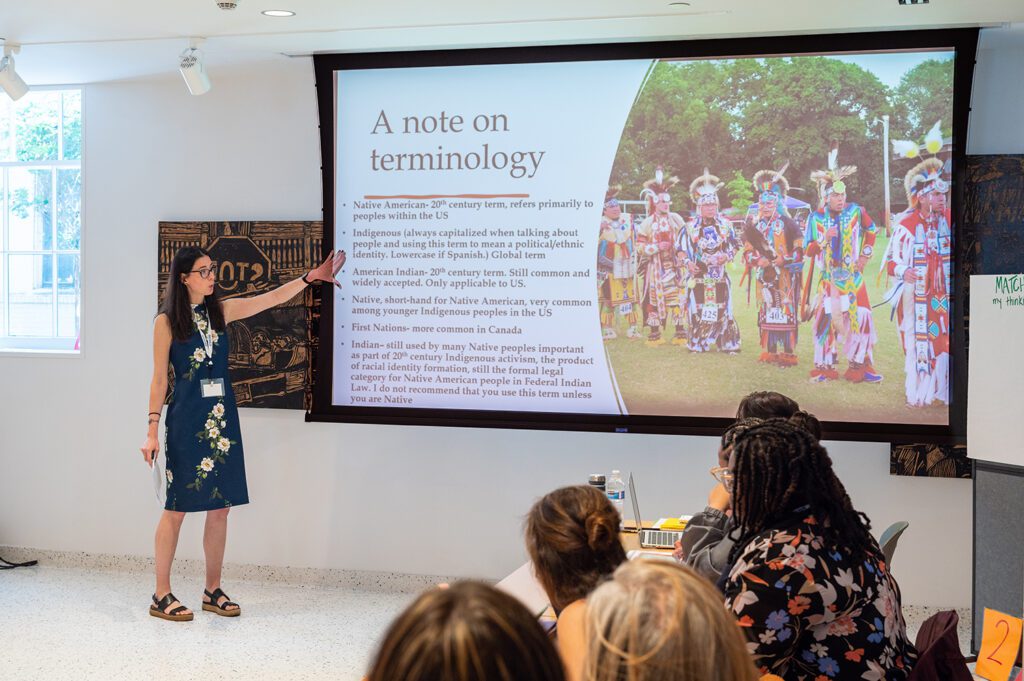
“I will approach this [school] year with more openness and energy! I have been revived in my ‘why!’…This workshop has lessened my anxiety and awaken[ed] my creativity.”
-Teacher workshop attendee
So far, the Louisiana Endowment for the Humanities’ Institute for Louisiana Culture and History has put on nine workshops—two summer intensives and seven regional one-day workshops. They have worked directly with 250 teachers representing 43 of Louisiana’s 64 parishes. And they estimate the online resources have reached about 90,000 Louisiana students. After creating an email list for those interested in receiving updates about encyclopedia entries and expanded resources, it’s gained over 5,000 subscribers. ILCH has also worked with external evaluators to measure the success of the workshops, which confirmed that teachers who attended gained a better understanding of the new standards and history content for their grades and that teachers came away with a more positive emotional outlook going into the school year.
This personal impact on educators was also something Program Manager Clare Shelburne observed during the workshops. She reflected on how rewarding it was to see these educators learn more about their own state, grow their confidence, and connect with other teachers. “Watching folks from across the state form a cohort together, realize they’re going through these same struggles and worries and anxieties, watching them form groups and lean on each other…was not part of the plan, [but] is now definitely among my highest priorities when we do these workshops.”
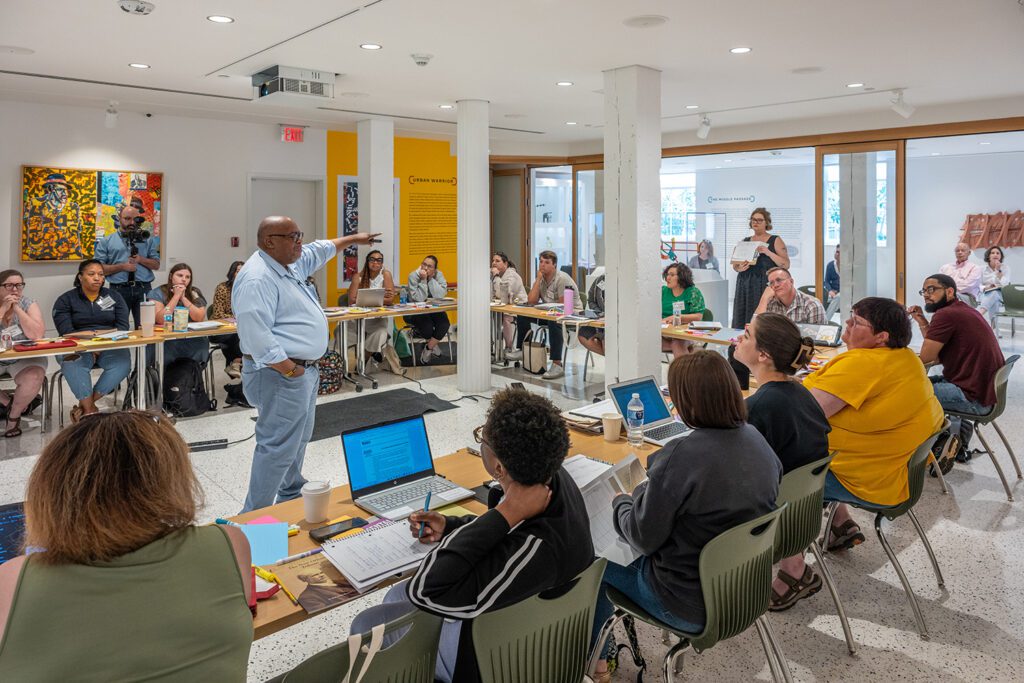
Going forward, the workshops will continue, but ILCH staff are eager to see where else this program can go. How else can they help teachers? The external evaluations showed a strong need for lesson plans, so the ILCH team has been working with independent curriculum and instructional specialists to pilot sample lessons that use the 64 Parishes resources. So, if an educator needs to teach a lesson on free people of color in Louisiana—to use an example shared by Shelburne—a sample lesson might include a list of 64 Parishes entries alongside grade-levelled worksheets, handouts, strategies, and games they can use to create two weeks of classroom content.
“The Institute for Louisiana Culture and History was designed to meet the moment and ensure that Louisiana’s educators and students not only have access to humanities resources of the highest integrity but are also encouraged and supported in deploying historical thinking skills. At LEH, we believe this is foundational work for our education system and for democracy.”
— Miranda Restovic, President and Executive Director of the Louisiana Endowment for the Humanities
A video about the Louisiana Institute for Culture and History created by the Louisiana Endowment for the Humanities.
Learn more about the humanities in Louisiana:
The Louisiana Endowment for the Humanities acts as a steward and supporter of Louisiana’s diverse and vibrant culture and history. To that end, they are dedicated to ensuring access to the humanities, offering and broadening pathways for a lifetime of learning for people of every generation and from every walk of life. They champion the humanities to enrich the lives of all Louisianans in all 64 parishes. LEH is one of fifty-six independent humanities councils across the United States and its territories.
LEH offers grants each year to cultural organizations and humanities nonprofits for emergency readiness, general operations, and programming. Other LEH programs include Prime Time, Inc., which offers learning programs designed to strengthen families and communities by harnessing the humanities; partnering with the Smithsonian Institution’s Museum on Main Street program to bring high quality exhibitions to rural audiences and small museums in Louisiana; and running the Louisiana Poet Laureate program.
Since their founding in 1971, LEH has invested $132 million in Louisiana communities and served over 53,000 individuals with education programs. In 2023 alone, LEH reached over two million people in Louisiana with humanities programming, distributed $1.5 million in grants, and invested $15.9 million in early childhood education.
